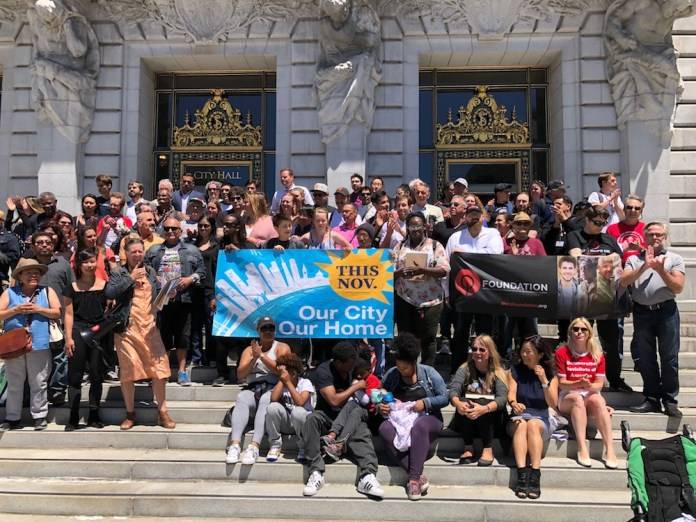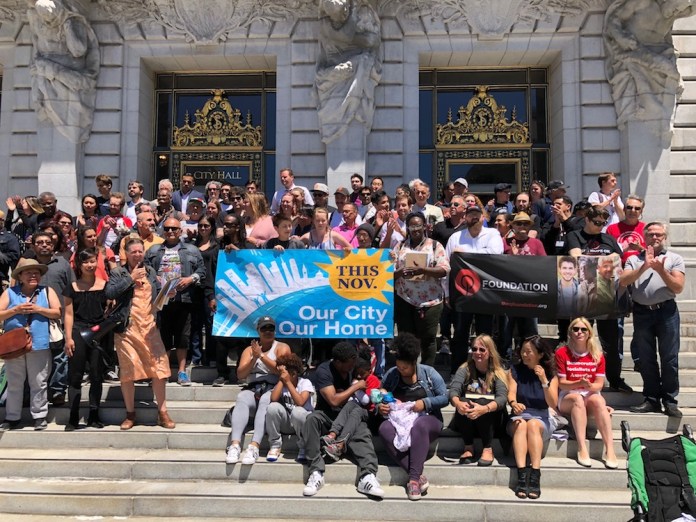
The Board of Supes Budget and Finance Committee will consider Thursday/16 a series of tax measures that could raise more than $100 million for the city and change the way business taxes are assessed.
It’s complicated – but the outcome is critical.
There are three major tax proposals. One, which Sups. Matt Haney, Gordon Mar, Shamann Walton, Hillary Ronen, and Gordon Mar signed their names to put on the ballot, would add an additional gross receipts tax on any company that pays its CEO 100 times the pay of a median employee in San Francisco. Another, which Mar, Ronen, Preston, and Peskin have put on the ballot, would tax stock options and stock-based compensation of workers in San Francisco whose companies are publicly traded.

Then there are the competing measures on the city’s major business tax.
The story on this goes back to 1999, when a group of companies that the Bay Guardian dubbed the Filthy 52 (including including Pacific Gas & Electric, Chevron, Bechtel, the Gap, Levi Strauss, General Motors, Equity Office Properties, Eastman Kodak, Safeway, Charles Schwab, the Hearst Corporation, the Giants, Macy’s, Neiman Marcus, Nordstrom, and the Shorenstein Company) sued San Francisco to eliminate the city’s gross-receipts tax.
Back then, San Francisco taxed companies based on either payroll or gross receipts, depending which formula was higher. The state won’t allow cities to impose a corporate income tax, so California cities have always scrambled to find the best and fairest way to tax businesses.
Gross receipts seems fine – except that some businesses, like supermarkets, have huge gross receipts and smaller profit margins, and some companies (like tech startups) have lots of money and a huge payroll but little or no gross receipts because they don’t have a marketable product yet.
Payroll is a fair approximation of the size of a company, and a tiny (1.5 percent) tax on gross payroll makes a certain amount of sense – but it’s not fair to charge, say, Salesforce the same percentage as a small corner store.
At any rate, the city used a hybrid for years, until the Filthy 52 came along. The city might have won the case, but Los Angeles had a similar case and folded, and the City Attorney’s Office apparently told the supes that they would lose, so the board voted to give the Filthy 52 $70 million in refunds and scrap the gross receipts tax.
The city lost $30 million a year as a result.
Then in 2012, the tech industry decided that it liked a gross receipts tax better than a payroll tax, so they convinced Mayor Ed Lee to reconsider the situation.
In the end, the supes approved a shift back to gross receipts – but the formula was highly favorable to tech companies, and brought the city no new revenue.
Everyone at the time agreed that the system might not work, and everyone agreed to revisit it in five years.
So now it’s been eight years, and the system clearly doesn’t work, and both the mayor and the supes have been meeting for some time now to figure out how to fix it.
Mayor London Breed put her own measure on the ballot for this fall. Sups. Sandra Lee Fewer, Norman Yee, Haney and Peskin have been crafting their own version.
Add in this complication: The voters have passed two measure to raise gross receipts taxes – and the right-wing anti-tax folks have sued. There’s half a billion in the city’s coffers right now that is desperately needed – but can’t be spent until the lawsuit is concluded.
That could happen soon – but if the Supreme Court decides to hear it, we’re talking at least another year.
So both tax measures include language that increases the gross receipts tax overall enough to cover the cost of the two ballot measures if they lose in court. That would allow the controller to release that money.
Both measures also change the balance so that tech companies would pay more than they do now.
The big difference is that the mayor’s measure is revenue-neutral – that is, she has spread the burden around so that some pay more, some pay less, but overall the city gets the same amount of money.
The supes plan would bring in at least $150 million in new revenue. Under the supes plan, more of that money would come from the biggest companies, and more small businesses would be exempted.
“It’s hard to imagine that the mayor doesn’t want to look at new revenue,” Haney told me. “It can’t all be cuts.”
As usual, as we approach the deadline to pull measures from the ballot, this is all in flux and everyone’s negotiating. But there’s a real chance here to do two things: Make the city’s business taxes more fair – and bring in a lot more money from the richest companies at a time when the city is going to be scrambling to preserve essential services.
The Planning Commission will hear Thursday/16 the city’s annual Housing Inventory Report. It includes some interesting – if entirely predictable – information.
According to the report, in 2019 the city added 4,850 housing units, the most in 20 years. That should have had at least some impact on prices and homelessness, if the Yimbys and the politicians who believe markets can solve the problem are correct.
But until the COVID crisis, there was no such impact.
Here’s one reason why:
The vast majority of the new units – 4,327 — were luxury condos, most of them in Soma. Of those, 405 were “inclusionary” affordable housing. That’s less than ten percent.
The city used in-lieu payments and other sources of money to subsidize the creation of 1,456 affordable units, the report says, which would mean overall the percentage of affordable housing was close to 30 percent.
But 177 of those “affordable” units were in-laws, or Accessory Dwelling Units, which are not price-regulated when they go on the market and are mostly not, at this point, “affordable” to most San Franciscans.
The Police Commission meeting Wednesday/15 has a couple of items that will be worth following. One:
Discussion and possible action to revise Department General Order 5.01, “Use of Force” pursuant to Department General Order 3.01.01 E (1) and (4). (Department Bulletin that Amends a Current General Order)
That’s a follow-up from a previous meeting where the panel decided – properly – that use-of-force policy is not something that has to be negotiated with the Police Officers Association. The POA is threatening to sue.
Among other things, the new policy would bar officers from putting their knees on the neck of a suspect – the tactic that killed George Floyd. It’s stunning that the POA would oppose that.
Then there’s this:
Discussion and possible action to adopt draft resolution expressing support for Black lives and direct the Chief to install BLM posters/signs within every police station.
I wonder if the POA will oppose it.

